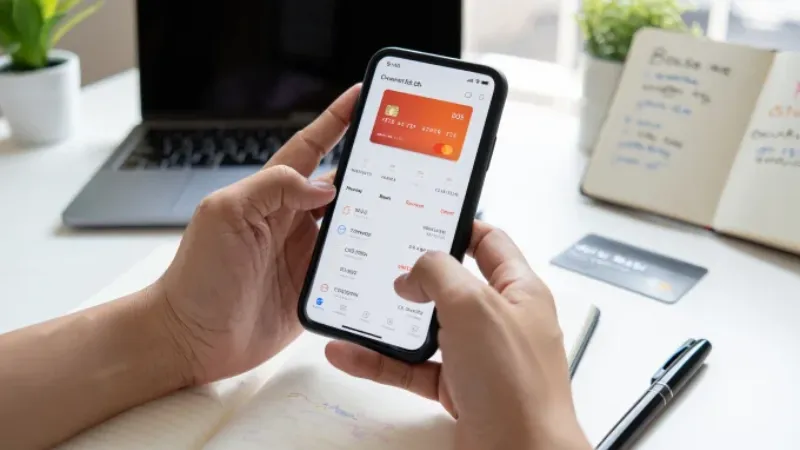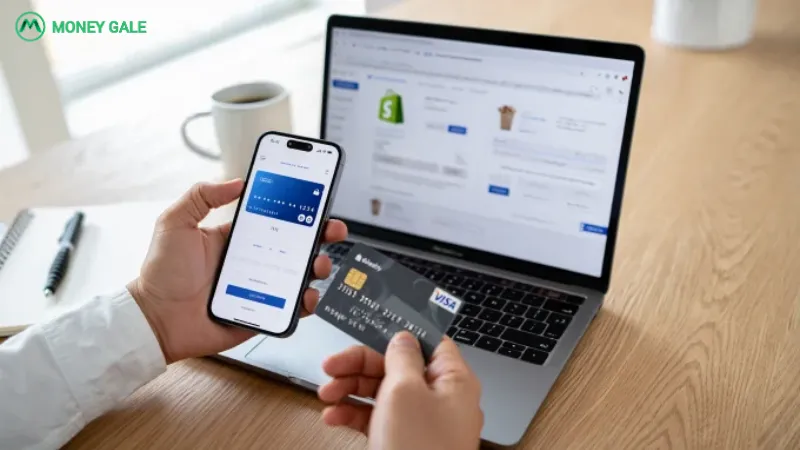India is rapidly moving towards a digital economy. With the rise of online payments and UPI handling over 18,000 crore transactions in FY 2024-25, virtual credit cards (VCCs) have become popular for their convenience and security. But many wonder: do virtual credit cards actually help build your credit score?
The answer is no in a direct sense. Virtual credit cards themselves do not create or improve your credit history. Instead, all credit activity on a virtual card is linked to the main physical credit card account. Therefore, your credit score depends on how responsibly you manage the primary card associated with the virtual card.
Here is a simple, clear guide from MoneyGale for 2025 explaining everything you need to know about virtual credit cards and credit scores.
What Is a Virtual Credit Card?
A virtual credit card is a digital-only credit card linked to your regular physical card. It has its own unique card number, CVV, and expiry date created electronically for online transactions. Using virtual cards helps to keep your actual card details safe from theft or fraud.
These cards cannot be used for in-person purchases or ATM withdrawals but are perfect for online shopping, subscriptions, and mobile wallet payments. The rise of UPI and digital banking has made virtual credit cards an essential tool for secure cashless payments.
How Virtual Credit Cards Affect Your Credit Score
Virtual credit cards do not open a new credit account and so they do not establish a separate credit history. All spending done through a virtual card is reported as part of your main credit card account activity.
Your credit score benefits or suffers based on these factors related to your primary account:
- Paying your credit card bills on time and in full improves your score.
- Keeping your credit utilization ratio low, ideally below 30 percent for better creditworthiness.
- Avoiding missed payments or defaults which hurt your credit score.
Therefore, simply having or using a virtual credit card does not change your credit score. The key is responsible use and timely payment on the underlying credit card.
RBI Guidelines for Virtual Credit Cards in 2025
The Reserve Bank of India regulates virtual credit cards to protect consumers. Current RBI regulations require that
- Virtual cards enforce two-factor authentication for all transactions.
- Sensitive card information is replaced with tokenization to protect privacy.
- Customers receive clear disclosure on fees and terms.
- Consumer rights are safeguarded, including opting out of unwanted loan conversion features.
- Credit bureaus are promptly updated with accurate transaction data.
These measures make virtual credit cards safe for online payments but do not influence credit scores by themselves.
Tips to Use Virtual Credit Cards to Support Good Credit

While the virtual card itself does not build credit, you can take these steps to improve your credit score via your main credit card:
- Always pay your credit card bill fully and on time.
- Keep your credit utilization ratio low by not maxing out your credit limit.
- Regularly review your statements to catch any unauthorized or incorrect charges.
- Set reminders or alerts to avoid forgetting payment due dates.
If you have no previous credit history, consider applying for a secured credit card (secured by fixed deposits) to establish a credit record, along with using virtual cards for secure spending.
Benefits and Limitations of Virtual Credit Cards
Using virtual credit cards gives you:
- Greater security when shopping online as real card details remain hidden.
- Instant card issuance for quick use without waiting for physical card delivery.
- Ability to set spending limits or use single-use cards to control subscriptions and reduce fraud risk.
However, virtual cards:
- Cannot be used for offline purchases or ATM withdrawals.
- Do not create a standalone credit history or influence your credit score independently.
Common Misunderstandings About Virtual Credit Cards and Credit Scores
Many people mistakenly believe that virtual credit cards on their own improve credit scores. Actually, only proper management of the main credit card account matters for credit building.
Also, RBI’s 2025 guidelines for virtual credit cards focus mainly on security and transparency, not credit scoring enhancements.
Beginners often overlook the importance of secured credit cards for starting a credit history before relying on virtual cards.
Final Thoughts From MoneyGale
Virtual credit cards are powerful tools for safe online transactions in India’s digital payment revolution. But if your goal is to build or improve your credit score, focus on responsible payment behavior on your primary credit card and maintain low credit utilization.
Stay informed on RBI’s evolving regulations and regularly check your credit reports from bureaus like CIBIL to catch errors that might affect your score.
For expert credit-building advice and personal finance tips, explore MoneyGale’s guides on credit score improvement.
Disclaimer
This article is intended for informational purposes only and should not be considered financial advice. Readers are encouraged to consult certified financial advisors or professionals before making any financial or credit-related decisions. MoneyGale and its authors do not endorse any specific financial products or services mentioned in this article.
Take control of your finances, credit, and digital payments with confidence. MoneyGale offers expert tips, simple guides, and up-to-date advice to help you make smart money decisions. Visit MoneyGale today and start managing your money smarter!

